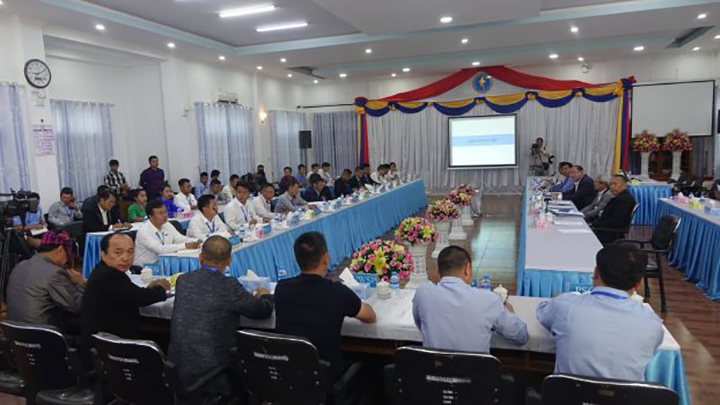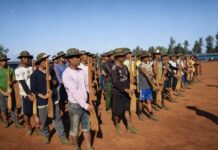Whether the Muse, northern Shan state, meeting of April 30 between government’s National Reconciliation and Peace Center (NRPC) and Norther Alliance-Burma (NA-B) will be fruitful or not will depend on if the question of Arakan Army (AA) insistence that it is its right to be stationed in Arakan state could be entertained by the government, including the military.
Fierce armed conflict occurred because AA is determine to establish its presence in Arakan state and the government’s total denial of it, citing that the hitherto “white” or government control areas couldn’t be allowed to compromise by allowing the AA to reside in an official manner as an ethnic resistance group. In other words, AA should stay in Kachin state where it was formed and must not settle in Arakan state although its trooper originated from it.

On May 3, the military or Tatmadaw held a press conference in Naypyitaw where it said during the four months long unilateral ceasefire period that ended at the end of April, there were more than 50 armed engagement with the Ethnic Armed Organizations (EAOs) within the five military regions covered by the ceasefire. In Arakan state which is not covered by the unilateral ceasefire, there were more than 120 armed clashes between the Tatmadaw and AA, within two months of March and April.
Regarding the Mrauk U township, Let Kar village, whose 27 residents were arrested earlier for the suspicion of being AA members, brigadier general Zaw Min Tun said: “What I want to tell about the arrested of 27 persons from Let Kar village is that 18 are AA members. All of them personally participated in the attack of police force number 31. Five are hardcore members and another four are suspects, which we have announced.”
He added that they will be taken care of according to the law. From the 27, three died during interrogation, one died of heart attack, one hanged himself and another committed suicide due to being a drugs addict, according to the Tatmadaw.
Zaw Min Tun also explained that 275 persons from Rathetaung township, Kyauktan village were detained. On May 2, six were shot dead as they tried to wrestle arms from the soldiers. Eight were wounded during the episode and four were missing. 126 were released as they are not suspected of being AA members and the rest were still being interrogated.
On May 6, another batch of 48 villagers were released and 78 still left in custody, according to VOA report.
On the same day with Muse meeting April 30, Tatmadaw announced the extension of the unilateral ceasefire for another two months until June 30, in the five military regions, covering Kachin , Shan and Karenni states excluding the Arakan state exactly like the prior one. It has earlier declared unilateral ceasefire for four months which lasted until from late December until April 30.
The NRPC and as well as the NA-B were in a sort of upbeat mode after the Muse meeting as both parties said that the latter’s proposal to first agree upon bilateral ceasefire before signing the Nationwide Ceasefire Agreement (NCA), subject to discussion for its amendment, the Tatmadaw shot it down when Tatmadaw true news information committee chairman general Soe Naing Oo said: “The meeting with NRPC is the forerunner. Therefore our position is that we need to discuss it further. So the Tatmadaw is not decided if it will accept the bilateral or not. We need to discuss it further.”
The NA-B approach is also the position of Federal Political Negotiation and Consultative Committee (FPNCC) with seven members. There were also speculation that the AA push into the Arakan state is being endorsed by the FPNCC, otherwise the AA might not have done it alone, according to some observers.
The military alliance NA-B is made up of AA, Kachin Independence Army (KIA), Ta’ang National Liberation Army (TNLA) and Myanmar National Democratic Alliance Army (MNDAA) or Kokang. The political alliance FPNCC includes Shan State Progress Party (SSPP), National Democratic Alliance Army (NDAA) or Mong La and United Wa State Army (UWSA) together with the NA-B four members.
Prior to the Muse meeting the NA-B on April 24, issued a harsh statement saying that it cannot stand idle while its military alliance member AA is being attacked and would take necessary action if the Tatmadaw offensives are not stopped. However, one of the four alliance members the KIA was not a signatory in this particular statement, possibly because it is in the middle of negotiation to resettle back its internally displace persons and also the ongoing bilateral ceasefire talk which is still not in place.
Part of the harsh statement wrote: “It would be assumed that the Myanmar military has no good will to solve the prolonged military conflicts if they declare nation-wide ceasefire excluding Arakan as previous unilateral announcement after 30 April 2019.”
The statement emphasized: “It is therefore informed that we will take an inevitable action of what we should do as a true alliance of the militarily allied brotherhood organization if Myanmar military keeps continue to intensify their offensive attacks against the Arakan Army after releasing this statement.”
In the aftermath of Muse meeting, on May 2, the NA-B again issued a statement on the outcome of the meeting, of which all four members were signatories. The statement rebutted the Tatmadaw’s statement of April 30, which alleged the NA-B asked for the extension of the unilateral ceasefire, saying that they have not said anything as such. Other than that it demanded that the Tatmadaw stopped the offensive on AA which is inappropriate and vowed to carry on the peace negotiation with genuine desire.
Analysis
Given such development on the ground, the main military deescalation starting point is likely to be the ending of armed conflict first between the AA and Tatmadaw in the north of Arakan state, followed by durable ceasefire between the NA-B and the Tatmadaw in Kachin and Shan states.
As all know, the fierce armed engagement in Arakan state seems now unstoppable due to the hardened uncompromising positions of the Tatmadaw and AA. It is now evident with over 35,000 villager have been displaced due to the armed clashes and more than 100 civilians, AA soldiers, Tatmadaw troops, and policemen have died during fighting since early January, when the hostilities escalated after Arakan fighters carried out deadly attacks on police outposts in northern Arakan.
And with the NA-B ultimatum to escalate the war if the Tatmadaw doesn’t stop its offensives against the AA in Arakan state nobody knows how the military situation will develop. But as of now the Tatmadaw has mainly battled the KIA in northern Shan state and according to its own account. It was said there were 14 armed clashes during the 130 days ceasefire period alone.
Thus it could be presumed that the Tatmadaw is ready to open more military front and perhaps already been doing it, with the pretext that the EAOs violated the Tatmadaw’s prescribed guidelines, at least in northern Shan state, where the NA-B members operate mainly as a group. But surprisingly, Kachin state is almost free of armed conflict during the four months unilateral ceasefire period.
In sum, with the Tatmadaw not on the same wavelength with the government’s NRPC in agreeing to a bilateral ceasefire with the NA-B, its hardliner’s attitude to subdue the EAOs through military pressure and counter measures declared by the NA-B, the war would likely go on for unforeseeable future.
However, an all out war for total victory against the EAOs in Kachin and Shan states is unlikely, the on and off with varying intensity will be the order of the day, as has been the case for decades.
But at the same time, the NA-B and NRPC vowed to meet again soon, which means the parallel approach of “fighting” and “talking” will go on for the time being.
And as all could see, the peace negotiation process is still on informal level because the NCA-based official negotiation has stalled since last November, due to the two most strongest and influential EAOs, the Karen National Union (KNU) and Restoration Council of Shan State (RCSS), opting out of participation in official peace process talks, citing unfairness and differences in the interpretation of the NCA between them and the government.
To break the deadlock, as time and again being suggested, the powers that be will have to weed itself of ethnocentrism or Bamar supremacy doctrine, accept equality and create level playing-field for all stakeholders, and above all to have political will in the establishment of acceptable federal union that all ethnic nationalities, including Bamar, could identify and live with.











Leave a Comments